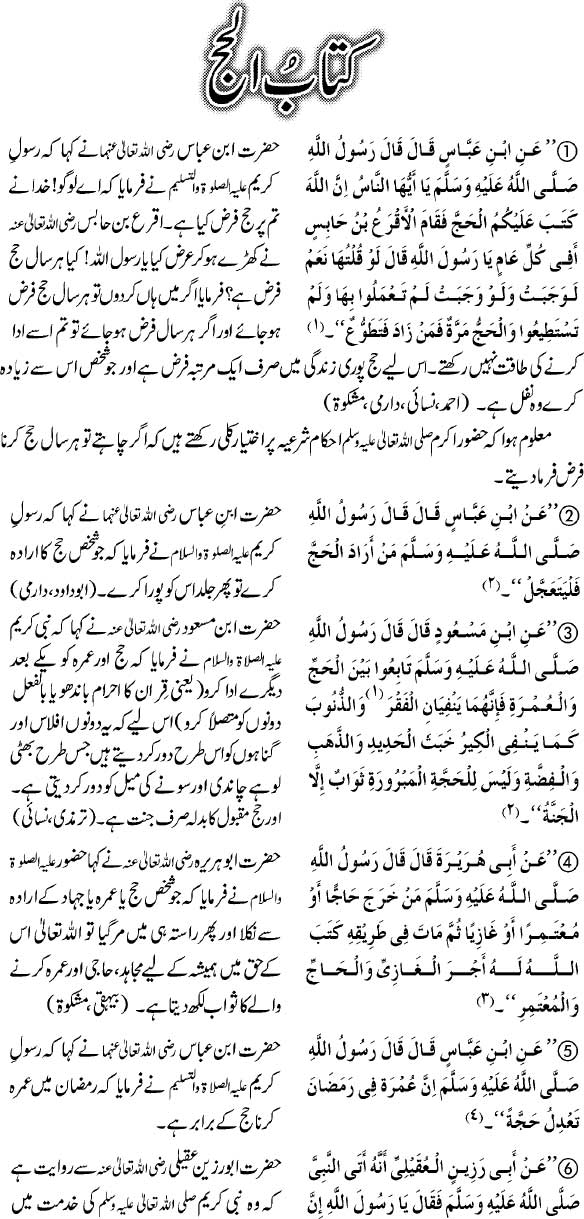

TAG: Hajj
Performing Haj With Gifted Money
HAJ is not obligatory except for those who are able to perform it. This includes the physical and financial ability. But if a person is given a donation through a lawful channel, then it becomes his own property and he can use it for Hajj. This consequently means that a person can give some money as a gift to another so that he can use it to perform Hajj.
It is generally allowed for a Muslim to offer his brother a gift. It is moreover a commendable act. The Prophet (peace be upon him) said: “Exchange presents so that you would exchange love.”
The only condition in this case, when someone pays for the Haj of another as a gift, is that it should be from lawful money. Actually, a sum taken as a gift is acquired through a lawful channel of earning, and thus there is nothing wrong with it, especially if the person who offered it is known for his honesty and trustworthiness. Therefore, a sister can give her brother the costs of Haj as a gift, in the same way, she can perform Haj on his behalf if he is physically unable to do it himself.
When Allah made Haj obligatory, He made the ability to afford it an essential condition for that obligation. Hence, Hajj is not an obligation except on those who can afford it. The exact ability to perform Hajj and to prepare oneself for it is not precisely dictated in the Shariah. What is really important is that such ability is acquired through lawful channels. So, as long as the financial ability is attained through lawful means, there is nothing in Shariah to prevent one from performing Haj from the donated money or the gifts that one receives. This applies whether the financial ability is obtained through work, donation, gift, or else. So, there is nothing wrong with performing Hajj with donated money.
Also, it is permissible to perform Haj, (obligatory or supererogatory) out of the money received as a prize, even if it is intended as some kind of support so that he can perform Haj with it. Hence, a prize or a donated sum transfers to the ownership of the recipient as soon as he or she is in possession of it, so he or she can use it as per his or her wishes.
The evidence of this is the incident of Barirah; she was given some meat in charity. Then she gave it as a gift to Aishah, the Mother of the Believers (may Allah be pleased with her). Aishah cooked the meat but did not present it to the Prophet (peace be upon him), thinking that the Prophet (PBUH) would not partake of it, as it was given in charity. But the Prophet (PBUH) said: “It is a charity on her part, but a present for us.” Then he ate from it.”
Raat Ko Sotey Waqt Kay Amliyat
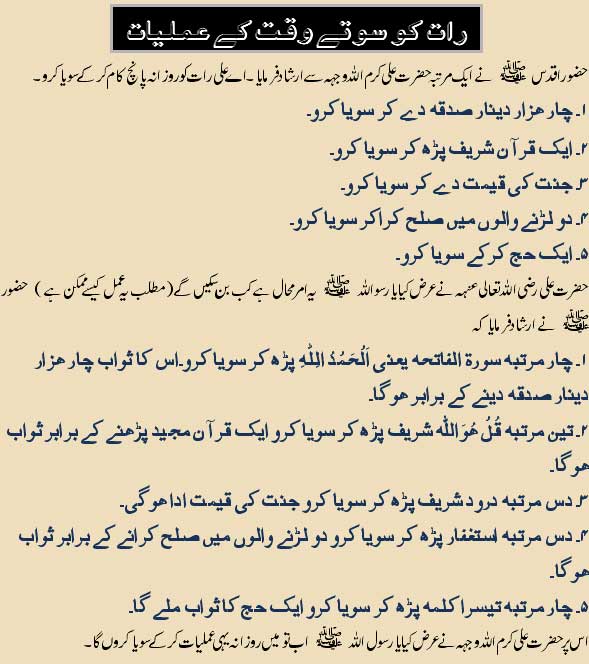
Hajj Rites – In Short
8 Dhul Hijjah
- Days of Tarwiyyah
- Assume Ihram
- Go to Mina
- Pray 5 Salaat, start with Dhuhr (shortened, but not joined) stay until sunrise of 9th
9 Dhul Hijjah
- Day of Arafat. Go to Arafat
- Join and shorten Dhuhr and ‘Asr at the time of Dhuhr
- Make such Du’aa until sunset
- Leave after sunset for Muzdalifah
- Pray Maghrib and ‘Isha in Muzdalifah and spend night there
10 Dhul Hijjah
- Pray Fajr as early as possible then go to Mina before sunrise
- Pick up seven pebbles
- Stone Jamarat Al ‘Aqabah
- Do sacrifice
- Cut hair (partially out of Islam)
- Do Tawaf Al-Ifadah (and Sa’ee) before sunset (fully out of Ihram)
- Stay in Mina
11 Dhul Hijjah
- Pick up 21 pebbles
- Throw pebbles in afternoon at small, medium and big Jamarat
- Stay in Mina for night
12 Dhul Hijjah
- Pick up 21 pebbles
- Throw pebbles in afternoon at small, medium and big Jamarat
- Stay in Mina for night or leave before Sunset
13 Dhul Hijjah
- Optional – Pick up 21 pebbles
- Throw pebbles in afternoon at small, medium and big Jamarat
- Stay in Mina for night or leave before Sunset
Hajj Aur Umrah Kernay Waloon Ki Niyatien
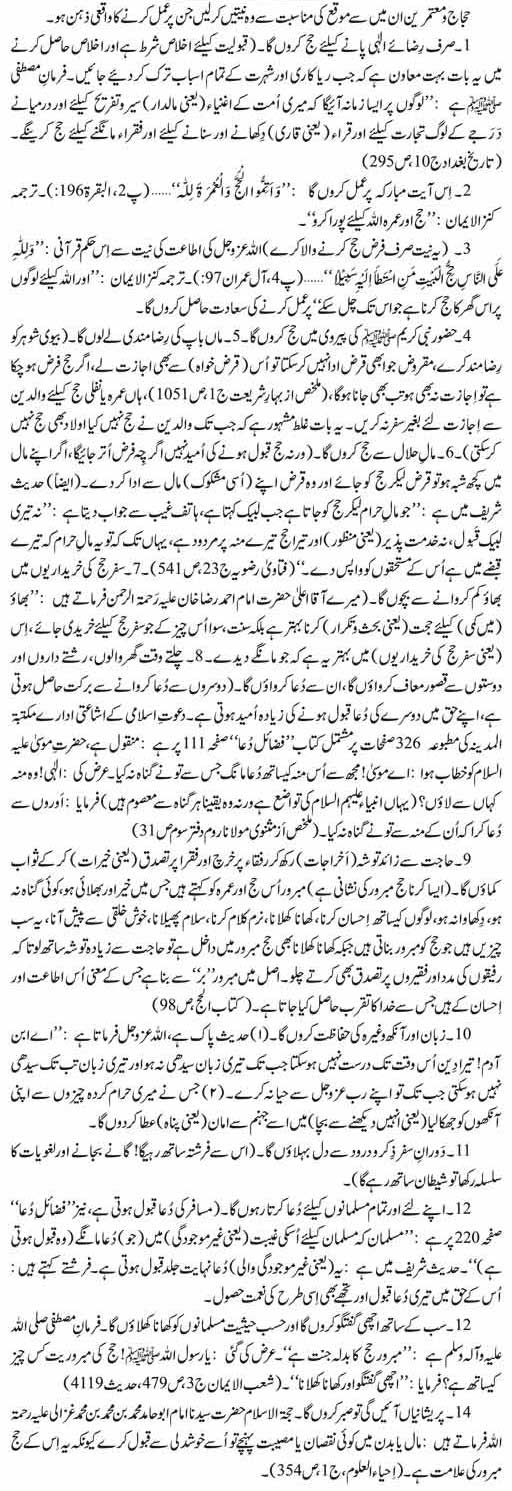
Hajj for Women: the Do’s and Don’ts
THE spirit of Haj is turning to Allah wholeheartedly in humble and passionate yearning and ardent love and devotion. This spirit should rule the hearts of all pilgrims at all times, regardless of gender differences.
Men and women during Haj also share equally in the various dos and don’ts. Both must refrain from all forms of intimate sexual contact with spouses. They also must shun all vain talks, wrangling, and quarrels.
Likewise, both males and females must absolutely avoid using any kind of perfumes or scents, clipping nails, removing, plucking, trimming or shaving of hair, etc.
It is, however, permissible for both males and females during ihram to bathe or take showers or wash.
Likewise, they are permitted to use ordinary shampoos, soaps or creams, lotions, etc. so long as these are not scented.
Specific issues or regulations that concern women exclusively during Haj can be listed as follows:
Unlike men, women are allowed to wear their normal clothes regardless of whether they are sewn or not. There are no restrictions whatsoever on the kind of clothes they can wear during the state of ihram so long as they are not dyed in saffron or scented. Thus it is permissible for them to wear even clothes with colors or designs; although women pilgrims may do well in keeping it simple and avoid attractive designs and colors. After all, it should be noted, the hallmark of Haj is simplicity and humility before the Creator.
Women, again as opposed to men, are also allowed to wear shoes, slippers or sandals as they choose.
Women, however, are not allowed to wear either face-veils or hand-gloves during ihram; they must not cover their faces while in a state of ihram.
Women who are menstruating should assume ihram after a bath and recite Talbiyah and engage in dhikr and dua. However, they must not offer Prayer.
Menstruating women can perform all of the rituals of Haj with the sole exception of Tawaf (going around the Kabah). As far as performing Tawaf is concerned, they should postpone it until such time that they are free from menses and have cleaned themselves through ghusl (bathing).
If, however, because of special circumstances beyond their control, they find themselves unable to stay in Makkah (for instance, they have no choice but to leave with the group because of inability to change or reschedule travel plans), then they are allowed to perform Tawaf while still menstruating after cleaning themselves and wearing pads, etc.
The above ruling is given by Imam Ibn Taymiyyah. It has been based on a valid principle of Islamic jurisprudence which states that any condition — upon which the validity of a certain act of worship is dependent — can be waived if a person cannot fulfill the same; and the act of worship thus performed will be considered as valid without it. An example for this is covering oneself during Prayer. Thus if a person finds himself unable to cover his awrah (what must be covered) because he could not find anything to wear, then he must still pray without covering himself and his prayer will still be considered as valid, although in ordinary circumstances such a Prayer will be considered as null and void.
The same rule applies to a menstruating woman who must leave Makkah because of special circumstances beyond her control. The normal condition of cleansing from menses for the validity of Tawaf is waived in her case, and her Haj will be considered as perfectly valid.
Finally, rules for women are relatively more relaxed in regards to throwing pebbles at the Jamrat in Mina (stone pillars). Thus women, as well as those who are weak and elderly, are allowed to leave Muzdalifah early before Fajr in order to perform the rite of throwing pebbles before the crowd arrives in Mina.
In conclusion, I must point out that while it is important to pay due attention to the formal aspects of Haj, one must never lose sight of the inner dimensions of Haj.
Hajj Bayt Allah Ki Taseer
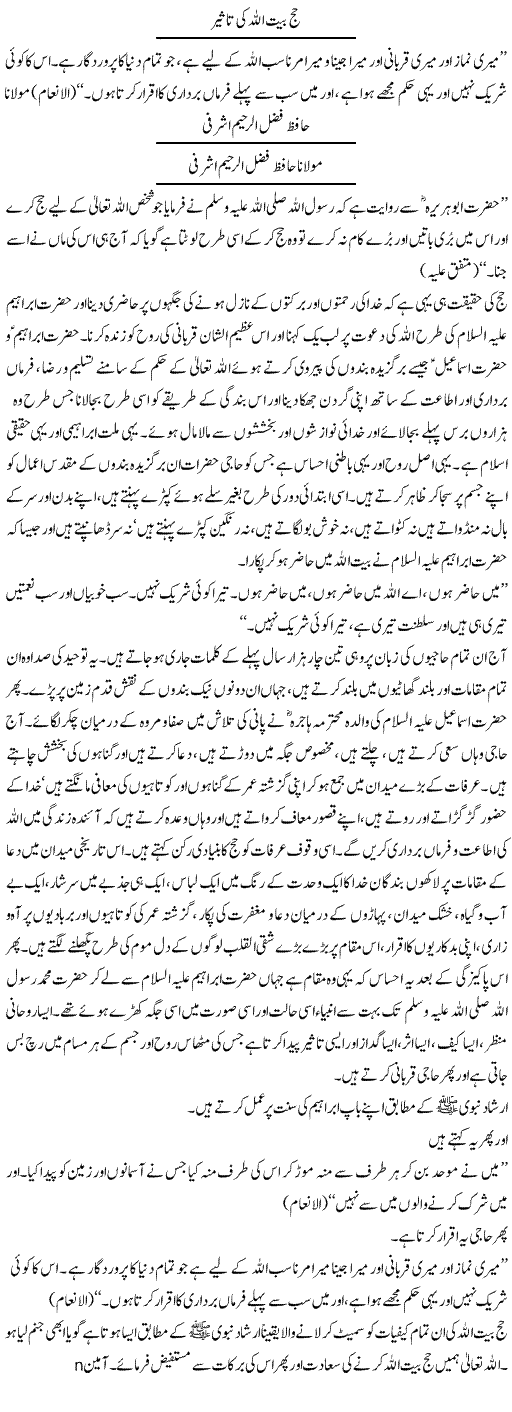
Wisdom Behind Shaving the Head During Haj
The wisdom is that by shaving off one’s hair, one demonstrates one’s sincerity and humility to Almighty Allah without caring for one’s physical appearance.
This practice of shaving or clipping the hair is affirmed by the Qur’an, the Sunnah of the Prophet, and the consensus of the Muslim scholars.
Almighty Allah says: “Indeed Allah shall fulfill the true vision which He showed to His Messenger (peace be upon him) [ i.e. the Prophet saw a dream that he has entered Makkah along with his Companions, having their (head) hair shaved and cut short] in very truth…” (48:27)
Both Al-Bukhari and Muslim quote the Prophet (peace be upon him) as saying, “May Allah bless those who shaved (their head during Haj).” The Companions asked, “O Messenger of Allah, what about those who cut their hair short?” Thereupon the Prophet (peace be upon him) said, “May Allah bless those who shaved.” They repeated their question the third time, and again the Prophet said, “May Allah bless those who shaved.” When they asked him for the fourth time, “O Messenger of Allah, what about those who clip their hair short?” He said, “And (may Allah bless) those who clip their hair short.”
Shaving here means removing hair of the head with a razor, etc., or plucking them out. It suffices, however, to remove only as many as three hair. And cutting the hair short means cutting the length of one fingertip of the head’s hair.
However, the issue of which one is obligatory, between shaving or cutting hair short, is controversial among jurists. Most scholars hold that shaving or cutting the hair short is obligatory, and one failing to do so is to slaughter an animal in order to atone for this omission.
According to the Shafi’i school, it is an integral part of Haj.
Fazail E Hajj
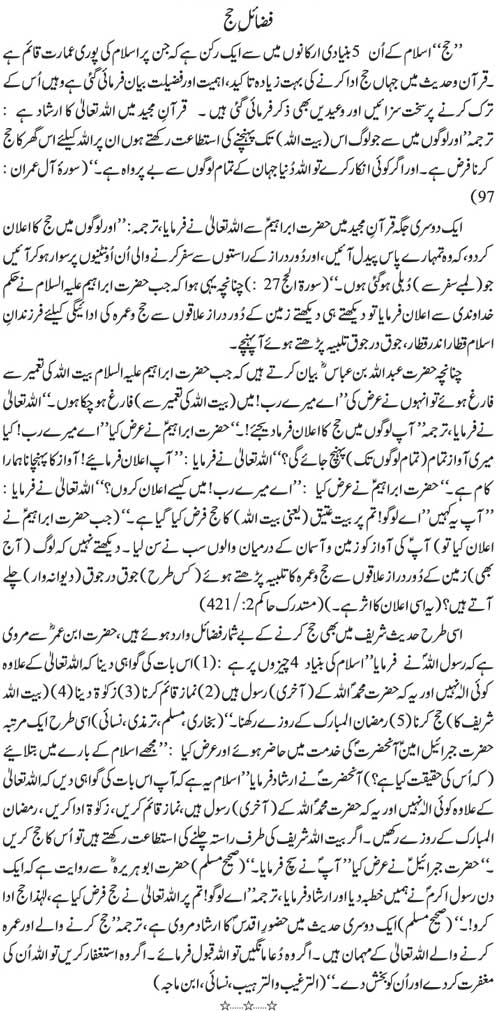
The Prophet’s Acts Of Worship During Hajj
The Prophet’s acts of worship during Haj – I
Tranquility
In his Haj, nothing could divert the Prophet’s (peace be upon him) attention away from his rituals, or from showing submission and humility before Allah. Standing with his hands raised close to his chest, he privately offered his supplication for extended periods of time. Secondly, all of the Prophet’s (peace be upon him) movements were full of submission and surrender to Allah, Almighty.
He would walk quietly in reverence and tranquility going about his rituals. Jabir (may Allah be pleased with him) reported: “The Prophet (peace be upon him) performed Al-Ifadha in tranquility.” (Al-Bukhari)
Ibn ‘Abbas (may Allah be pleased with him) reported that as he and the Prophet (peace be upon him) were moving together on the Day of ‘Arafah, they heard loud noises, clattering and roars of camels. The Prophet (peace be upon him) then pointed his whip at the people and said: “Be quiet; haste is no indication of righteousness!” (Tirmidhi)
Doing plenty of good deeds
Not only did the Prophet (peace be upon him) enjoined good, he (peace be upon him) was also keen on doing the same during the Haj. This is manifest in his performance of all the recommended Haj rituals.
He performed Ghusl (ritual body wash) and wore perfume before assuming Ihram, marked and garlanded the sacrificial animal, and frequently recited the Talbiyah aloud until he (peace be upon him) had cast the Jamaratul-’Aqabah.
He also started Tawaf as soon as he entered the House, walked briskly in Tawaf, touched the two corners of the Ka’bah, offered two Rak’ahs of Tawaf behind Maqaam Ibrahim (Ibrahim’s station), supplicated Allah on the hills of Safa and Marwah, ran in the middle of the valley, supplicated upon touching the two corners and while throwing pebbles at the Jamaraat. (Paraphrased from Al-Bukhari and Muslim) There are many other acts that he (peace be upon him) performed.
Moderation and equanimity
Islam encourages moderation and censures exaggeration. In fact equanimity was the most significant attitude of the Prophet (peace be upon him) in the Haj. He (peace be upon him) abhorred exaggeration. He (peace be upon him) did neither too much nor too little. Two acts of worship can be stressed in this regard. Firstly, he (peace be upon him) adopted a wholesom middle course between his acts of worship and his responsibility as the leader of the Muslims. However, he (peace be upon him) did not neglect his duty to his wives and his household who needed care and affection. Secondly, he (peace be upon him) also took equal care of his body and soul.
This is a very important point, as the awe-inspiring surroundings of the Haj may compel many people to observe the spiritual and entirely forget the physical side of their being.
The Prophet (peace be upon him) however, took very good care of his body. For example, on Tarwiyah Day he (peace be upon him) moved closer to Mina in order to be near ‘Arafah (Sahih Muslim); slept during the nights of ‘Arafah and Muzdalifah (Al-Bukhari); took breakfast on the Day of ‘Arafah (Al-Bukhari); but did not offer supererogatory prayers. (Sahih Muslim)
He (peace be upon him) stayed in a dome made from the camel’s hair erected especially for him, moved between the sacred sites (Al-Bukhari), and performed some of the Haj rituals riding on camel’s back (Muslim). Furthermore, he even had someone who served and helped him. (Ibn Majah)
Giving up worldly life
The Prophet (peace be upon him) renounced the present life and rejected all that was not needed for the Hereafter. There are countless examples of his attitude of looking down upon the worldly life. Listed are but a few: He (peace be upon him) used an old, shabby camel saddled with a piece of velvet hardly worth four dirhams (silver currency). He (peace be upon him) allowed Usamah Ibn Zayd (may Allah be pleased with him) to ride behind him on his camel’s back from ‘Arafah to Muzdalifah, and allowed Al-Fadhl Ibn ‘Abbas (may Allah be pleased with him) to ride behind him from Muzdalifah to Mina. (Al-Bukhari)

